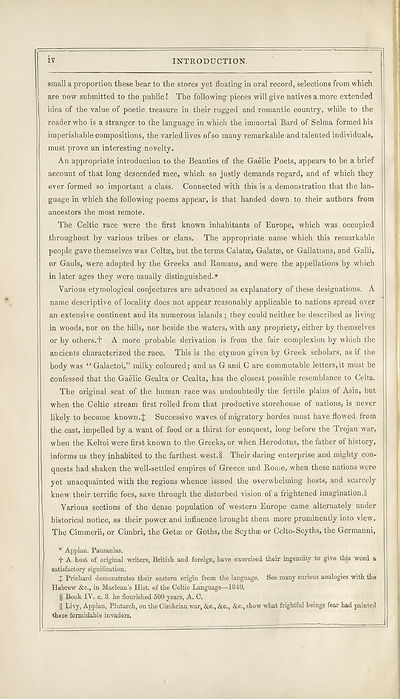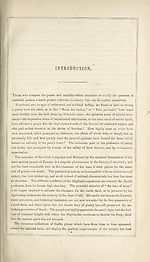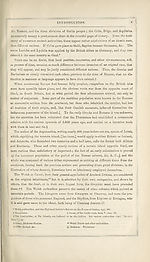Books and other items printed in Gaelic from 1871 to 1900 > Sar-obair nam bard Gaelach, or, The beauties of Gaelic poetry, and lives of the Highland bards
(16) Page iv
Download files
Complete book:
Individual page:
Thumbnail gallery: Grid view | List view

IV
INTRODUCTION.
small a proportion these bear to the stores yet floating in oral record, selections from which
are now submitted to the public! The following pieces will give natives a more extended
idea of the value of poetic treasure in their rugged and romantic country, while to the
reader who is a stranger to the language in which the immortal Bard of Selma formed his
imperishable compositions, the varied lives of so many remarkable and talented individuals,
must prove an interesting novelty.
An appropriate introduction to the Beauties of the Gaelic Poets, appears to be a brief
account of that long descended race, which so justly demands regard, and of which they
ever formed so important a class. Connected with this is a demonstration that the lan¬
guage in which the following poems appear, is that handed down to their authors from
ancestors the most remote.
The Celtic race were the first known inhabitants of Europe, which was occupied
throughout by various tribes or clans. The appropriate name which this remarkable
people gave themselves was Celt®, but the terms Calatse, Galatae, or Gallatians, and Galli,
or Gauls, were adopted by the Greeks and Romans, and were the appellations by which
in later ages they were usually distinguished.*
Various etymological conjectures are advanced as explanatory of these designations. A
name descriptive of locality does not appear reasonably applicable to nations spread over
an extensive continent and its numerous islands ; they could neither be described as living
in woods, nor on the hills, nor beside the waters, with any propriety, either by themselves
or by others.f A more probable derivation is from the fair complexion by which the
ancients characterized the race. This is the etymon given by Greek scholars, as if the
body was “ Galactoi,” milky coloured; and as G and C are commutable letters,it must be
confessed that the Gaelic Gealta or Cealta, has the closest possible resemblance to Celta.
The original seat of the human race was undoubtedly the fertile plains of Asia, but
when the Celtic stream first rolled from that productive storehouse of nations, is never
likely to become known. J Successive W'aves of migratory hordes must have flowed from
the east, impelled by a want of food or a thirst for conquest, long before the Trojan war,
when the Keltoi were first known to the Greeks, or when Herodotus, the father of history,
informs us they inhabited to the farthest west.i Their daring enterprise and mighty con¬
quests had shaken the well-settled empires of Greece and Rome, when these nations were
yet unacquainted with the regions whence issued the overwhelming hosts, and scarcely
knew their terrific foes, save through the disturbed vision of a frightened imagination.il
Various sections of the dense population of western Europe came alternately under
historical notice, as their power and influence brought them more prominently into view.
The Cimmerii, or Cimbri, the Get® or Goths, the Scythae or Celto-Scyths, the Germanni,
* Appian. Pausanias.
d* A host of original writers, British and foreign, have exercised their ingenuity to give this word a
satisfactory signification.
J Prichard demonstrates their eastern origin from the language. See many curious analogies with the
Hebrew &c., in Maclean’s Hist, of the Celtic Language—1840.
§ Book IV. c. 3. he flourished 500 years, A. C.
|| Livy, Appian, Plutarch, on the Cimbrian war, &c., &c., &c., show what frightful beings fear had painted
these formidable invaders.
INTRODUCTION.
small a proportion these bear to the stores yet floating in oral record, selections from which
are now submitted to the public! The following pieces will give natives a more extended
idea of the value of poetic treasure in their rugged and romantic country, while to the
reader who is a stranger to the language in which the immortal Bard of Selma formed his
imperishable compositions, the varied lives of so many remarkable and talented individuals,
must prove an interesting novelty.
An appropriate introduction to the Beauties of the Gaelic Poets, appears to be a brief
account of that long descended race, which so justly demands regard, and of which they
ever formed so important a class. Connected with this is a demonstration that the lan¬
guage in which the following poems appear, is that handed down to their authors from
ancestors the most remote.
The Celtic race were the first known inhabitants of Europe, which was occupied
throughout by various tribes or clans. The appropriate name which this remarkable
people gave themselves was Celt®, but the terms Calatse, Galatae, or Gallatians, and Galli,
or Gauls, were adopted by the Greeks and Romans, and were the appellations by which
in later ages they were usually distinguished.*
Various etymological conjectures are advanced as explanatory of these designations. A
name descriptive of locality does not appear reasonably applicable to nations spread over
an extensive continent and its numerous islands ; they could neither be described as living
in woods, nor on the hills, nor beside the waters, with any propriety, either by themselves
or by others.f A more probable derivation is from the fair complexion by which the
ancients characterized the race. This is the etymon given by Greek scholars, as if the
body was “ Galactoi,” milky coloured; and as G and C are commutable letters,it must be
confessed that the Gaelic Gealta or Cealta, has the closest possible resemblance to Celta.
The original seat of the human race was undoubtedly the fertile plains of Asia, but
when the Celtic stream first rolled from that productive storehouse of nations, is never
likely to become known. J Successive W'aves of migratory hordes must have flowed from
the east, impelled by a want of food or a thirst for conquest, long before the Trojan war,
when the Keltoi were first known to the Greeks, or when Herodotus, the father of history,
informs us they inhabited to the farthest west.i Their daring enterprise and mighty con¬
quests had shaken the well-settled empires of Greece and Rome, when these nations were
yet unacquainted with the regions whence issued the overwhelming hosts, and scarcely
knew their terrific foes, save through the disturbed vision of a frightened imagination.il
Various sections of the dense population of western Europe came alternately under
historical notice, as their power and influence brought them more prominently into view.
The Cimmerii, or Cimbri, the Get® or Goths, the Scythae or Celto-Scyths, the Germanni,
* Appian. Pausanias.
d* A host of original writers, British and foreign, have exercised their ingenuity to give this word a
satisfactory signification.
J Prichard demonstrates their eastern origin from the language. See many curious analogies with the
Hebrew &c., in Maclean’s Hist, of the Celtic Language—1840.
§ Book IV. c. 3. he flourished 500 years, A. C.
|| Livy, Appian, Plutarch, on the Cimbrian war, &c., &c., &c., show what frightful beings fear had painted
these formidable invaders.
Set display mode to: Large image | Transcription
Images and transcriptions on this page, including medium image downloads, may be used under the Creative Commons Attribution 4.0 International Licence unless otherwise stated. ![]()
| Permanent URL | https://digital.nls.uk/109809265 |
|---|
| Description | Out-of-copyright books printed in Gaelic between 1631 and 1900. Also some pamphlets and chapbooks. Includes poetry and songs, religious books such as catechisms and hymns, and different editions of the Bible and the Psalms. Also includes the second book ever published in Gaelic in 1631. |
|---|

